|
|
|
Sort Order |
|
|
|
Items / Page
|
|
|
|
|
|
|
| Srl | Item |
| 1 |
ID:
135105


|
|
|
|
|
| Summary/Abstract |
Without doubt, parental love is one of the world’s greatest emotions, regarded as the premise of the filial piety (Xiao in Chinese pinyin) of Chinese people. However, to enhance filial duties, the notion of ‘all good is of parents’ in the official campaigns of China is worth further investigation. This article seeks to verify the hypothesis ‘all good is of parents’ by examining conflicts between the hypothesis and reality, first through classic documents and current documentary reporting in China, and then through the lens of psychology.
|
|
|
|
|
|
|
|
|
|
|
|
|
|
|
|
| 2 |
ID:
136278


|
|
|
|
|
| Summary/Abstract |
Knowledge of poverty prevalence is essential for any society concerned with improving public welfare and reducing poverty. In this paper, we estimate and compare poverty incidence rates in China using four nationally representative surveys: the China Family Panel Studies (CFPS) of 2010, the Chinese General Social Survey (CGSS) of 2010, the China Household Finance Survey (CHFS) of 2011, and the Chinese Household Income Project (CHIP) of 2007. Using both international and official domestic poverty standards, we show that poverty rates at the national, rural, and urban levels based on the CFPS, CGSS, and the CHFS are all much higher than the official estimates and those based on the CHIP. This study highlights the importance of using independent datasets to verify official statistics of public and policy concern in contemporary China.
|
|
|
|
|
|
|
|
|
|
|
|
|
|
|
|
| 3 |
ID:
136270


|
|
|
|
|
| Summary/Abstract |
Measures of wealth (‘net’) capital stock (WKS) can be used for measuring economic exposure to natural disasters and thus are essential for disaster risk management in terms of both quick loss estimation during emergency responses and post-disaster planning for recovery and reconstruction. Today, the improved availability of statistical data and the progress of capital stock estimation methods have made it possible to produce datasets of WKS on the prefecture level. By applying the perpetual inventory method (PIM) to estimate prefecture-level WKS in China from 1978 to 2012, this paper aims to illustrate both the methodology for generating the WKS dataset and the utility of the WKS as a useful indicator of economic exposure to potential hazards. The estimation results indicate that the accumulated WKS for Mainland China had reached RMB 152 trillion by 2012, and it has maintained an average annual growth rate of 14% since 1990. Spatially, the uneven distribution of WKS is distinct, with approximately 47% being concentrated in the eastern economic region, and approximately 60% to 22% of China's prefectures. Methodologically, the dataset can easily be extended to more recent years with available data. Furthermore, a systematic sensitivity analysis indicates that the depreciation rate is the most important parameter for WKS estimates. Notwithstanding certain limitations, the paper concludes that such WKS estimates, in particular with its finer spatial resolution, offer a useful baseline for quick disaster loss estimation.
|
|
|
|
|
|
|
|
|
|
|
|
|
|
|
|
| 4 |
ID:
134873


|
|
|
|
|
| Summary/Abstract |
Over the reform period, industry has been the source of 40% of GDP, and has contributed 90% of China's exports. Annual firm-level surveys that begin in 1992, complemented with industry-wide census in 1995, 2004 and 2008, are rich sources of data on firm behavior. It is well-known that working with Chinese data requires overcoming difficult measurement issues. Macroeconomic series, for example, are often suspected of suffering from reporting bias and political interference. Working with the firm-level data has its own challenges. In this paper, we provide an introduction to these data sets. We discuss and illustrate several of the issues that make comparability over time difficult and suggest solutions. The importance of a particular measurement issue often depends on the exact application. We illustrate this point by tracing the evolution of the relative productivity level of entrants and incumbents over time, distinguishing between changes in actual performance and changes driven by measurement problems. We conclude by identifying a few promising areas of future research and margins on which collaboration among users to improve these data might be beneficial
|
|
|
|
|
|
|
|
|
|
|
|
|
|
|
|
| 5 |
ID:
136438


|
|
|
|
|
| Summary/Abstract |
In 2007, China created the China Investment Corporation (CIC), a sovereign wealth fund (SWF). There is much anxiety about how Beijing will deploy this US$500 billion fund. Specifically, there are concerns that Beijing may use the CIC to sanction others, gain control of other countries’ key assets, or challenge the international order. This analysis demonstrates that China is not wielding its SWF aggressively as an instrument of economic statecraft. Instead, Beijing primarily leverages it in order to advance its domestic objectives. However, China does use the CIC to enhance its natural resource security and build international partnerships.
|
|
|
|
|
|
|
|
|
|
|
|
|
|
|
|
| 6 |
ID:
134759


|
|
|
|
|
| Summary/Abstract |
The rise of China has important implications for the regional order in East Asia. Such implications are not limited to material calculations, such as the size of China’s economy and its military expenditure, but also include an ideational dimension. This article examines the rise of China from the perspective of the recent development of Chinese international relations (IR) theory. Rather than being a purely academic pursuit of theoretical pluralism in the discipline, the development of IR theory in China is also a political practice seeking to address the important problem of China’s rise; that is, the threat perception of a rising power informed by rationalist IR theory. Drawing upon traditional Chinese political thought, Chinese IR scholars have engaged to debate the possibility of a benevolent power within a hierarchical international order, similar to Asia’s historic tribute system. Nevertheless, such a proposal faces limitations, at both the theoretical and practical levels, that cast doubt on the efficacy of (re)creating Asia’s future in the image of its past.
|
|
|
|
|
|
|
|
|
|
|
|
|
|
|
|
| 7 |
ID:
134699
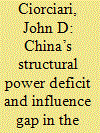

|
|
|
|
|
| Summary/Abstract |
As China rises, its influence on other states’ policy choices will depend partly on the extent of its “structural power.” This article examines China’s role in Asian monetary affairs and argues that deficient structural power has contributed to a significant gap between China’s waxing economic resources and its policy influence.
|
|
|
|
|
|
|
|
|
|
|
|
|
|
|
|
| 8 |
ID:
136236


|
|
|
|
|
| Summary/Abstract |
We analyze China's sovereign debt by constructing balance sheets for China's government and public sector. We find that China's government debt-to-GDP ratio is lower than that of most large developed economies. We also find the debt-to-asset ratio of China's government and public sector significantly lower than its own historical height (1998–2002). Local government debt is mainly to finance infrastructure investments. Local government debt risk is amplified by two mismatches. The first is the income-expenditure mismatch between central and local governments. The second is the maturity mismatch of short-term debt and long-term infrastructure investments. The maturity mismatch may cause short-term repayment difficulties
|
|
|
|
|
|
|
|
|
|
|
|
|
|
|
|
| 9 |
ID:
136990
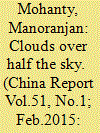

|
|
|
|
|
| Summary/Abstract |
This article addresses the question of why despite the enormous success achieved by China in economic growth there are significant indicators showing relatively adverse life situations for women in many respects. A falling proportion of women in the population, unfavourable employment situation, disparity in wages, inadequate representation of women in political leadership are some of the indicators of the negative fallout of the Chinese growth story even as women too have benefited from the substantial improvement of Chinese people’s livelihood conditions during the recent decades. Based on field visits to Wuxi over a thirty-year period and using macro data we argue that the Chinese experience raises serious questions about the pattern of economic growth that has been adopted by the Chinese leadership and advanced globally in recent years.
|
|
|
|
|
|
|
|
|
|
|
|
|
|
|
|
| 10 |
ID:
136224


|
|
|
|
|
| Summary/Abstract |
We study whether local credit ratings alleviate information asymmetry inherent in the fast growing Chinese market by examining the syndicate structure of loans issued by Chinese borrowers in 2003–2011. Despite the common criticism regarding the quality of Chinese credit ratings, our results suggest that they serve an important role in reducing information asymmetry in the market between corporate insiders and outside borrowers
|
|
|
|
|
|
|
|
|
|
|
|
|
|
|
|
| 11 |
ID:
134878
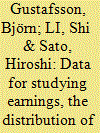

|
|
|
|
|
| Summary/Abstract |
This paper discusses data used in publishing statistics on earnings, the distribution of household income and poverty in China by the National Bureau of Statistics (NBS) which is widely used by policy makers, international agencies and researchers. Unlike many other countries, China until recently had a dual system of household surveys — one rural and one urban. This has had consequences for providing official data on wages, income and poverty which we discuss along with other challenges. Since the end of the 1980s, researchers have been active in the construction of large databases aimed at mapping earnings, household income and poverty, and we present seven of these in the paper.
|
|
|
|
|
|
|
|
|
|
|
|
|
|
|
|
| 12 |
ID:
136276
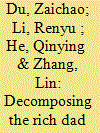

|
|
|
|
|
| Summary/Abstract |
In this paper we evaluate the relative importance of the two main channels, namely the composition effect and the income structure effect, through which the paternal income affects children's income inequality. Using data on 2677 pairs of father and children from China Health and Nutrition Survey (CHNS), we construct the counterfactual income of children from poor families if they had the same characteristics as children from rich families. We propose an instrumental variable quantile regression-based method to solve the endogeneity problem and decompose the rich dad effect on income inequality into the composition effect and the income structure effect. We find that the composition effect explains at least 80% of the income difference at any quantile, and it explains all the income difference at the top four deciles. Income structure effect has a significant impact only at quantiles between 20% and 40%, where it explains about 20% of the income difference
|
|
|
|
|
|
|
|
|
|
|
|
|
|
|
|
| 13 |
ID:
134866


|
|
|
|
|
| Summary/Abstract |
This paper presents a model of resource management for resource exporters to analyse how the persistence of resource intensive growth in China should affect the depletion of non-renewable resources imported by China. We show that the depletion rate equals the difference between the price elasticity of China's resource import demand times the world interest rate and growth in China's resource import demand. Results indicate that: the temporary increase in China's demand associated with stockpiling resources raises the level of resources extracted for export to China, but does not affect the rate at which resources are depleted over time; the growth in China's demand for resource imports and exponential rise in prices during the contemporary resources boom reduces the rate at which resources should be depleted over time; the depletion rate picks up towards the end of the boom as the growth in China's demand is set to slow. Patterns in the depletion rate of iron ore exported to China, 2001–2011 are in line with the theory.
|
|
|
|
|
|
|
|
|
|
|
|
|
|
|
|
| 14 |
ID:
135979


|
|
|
|
|
| Summary/Abstract |
This paper focuses on a conventional debate regarding whether Chinese outward direct investors tend to invest in countries with high political risk. Using 2003–2011 data from the World Bank, the Heritage Foundation and the KOF Swiss Economic Institute, we investigate China's political risk distribution and political risk index (PRI). Our results indicate that China's political risk index was ranked 48th among 153 economies in 2011, in the lower risk level of the PRI spectrum. In an international comparison of political risk distribution, the proportion of Chinese outward direct investment (ODI) among countries with high political risk is less than the world average. The Chinese ODI political risk index has significantly improved and remains lower than the world average. To improve Chinese ODI PRI, the Chinese Government should continue to implement differentiation strategies and to offer official development assistance to improve the investment environment in developing countries and reduce political risk.
|
|
|
|
|
|
|
|
|
|
|
|
|
|
|
|
| 15 |
ID:
136263


|
|
|
|
|
| Summary/Abstract |
Using nationally representative rural household panel data from 2003 through 2007 in China, we examine economic gains of cadre status and channels through which cadre status increases household earnings. We find that income of cadre households was approximately 10 percent higher than that of non-cadre households on a per capita basis. The cadre income premium did not come from agricultural income but mainly from non-agricultural sources, especially the income from the village and the government. We also find that cadre income premiums were much larger and more significant in economically advanced regions than in less developed regions and in villages that exhibited higher income inequality than their counterparts. Furthermore, this study shows that newly elected cadre households acquired the economic gains immediately and cadre households lost the economic gains immediately when they lost their cadre status, which implies that the cadre economic gains were less likely attributable to human capital of cadres but mainly due to cadre status. Our findings provide evidence for the ongoing debate on distribution of economic gains during the process of transition in emerging market economies.
|
|
|
|
|
|
|
|
|
|
|
|
|
|
|
|
| 16 |
ID:
134870
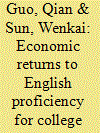

|
|
|
|
|
| Summary/Abstract |
The present study examines the economic returns to English proficiency for college graduates in Mainland China, paths through which English proficiency may affect earnings, and possible moderation effects and crowding-out effects of English proficiency on other human capital. The analysis results indicate that English proficiency had significant effects on college graduates' starting salaries, their probability of changing permanent residence status from rural to urban, and their future earning potential. Possible reasons for the economic returns to English proficiency include increased chances of working in the employment sector where the average income was higher than in the other sectors and improved opportunities of landing job interviews. English proficiency may mitigate the effects of GPA rankings on salaries. Meanwhile, it did not seem to have been achieved at the expense of other important human capital investments. The results have policy implications as well as contributing to the literature.
|
|
|
|
|
|
|
|
|
|
|
|
|
|
|
|
| 17 |
ID:
136264


|
|
|
|
|
| Summary/Abstract |
This case study compares the environmental efficiency of non-certified organic and conventional rice production in southern China. Using plot-season level survey data, we test the existence of a “technology gap” between the two types of production, and calculate their environmental efficiency scores based on the level of pure nitrogen use, which is considered as an environmentally detrimental input within the framework of the stochastic frontier analysis. Our analysis reveals that organic farming loses its environmental performance at high nitrogen levels and that during the initial conversion period to organic farming newly converted organic farmers increase the use of external nutrients such as nitrogen to compensate for potential yield losses. These results highlight the uncertainty with which conventional farmers initially tend to view organic farming. However, we find that the experience gained by organic farmers over time helps them increase and maintain the environmental efficiency. We warn against the rapid expansion of organic farming and recommend more technical support and strict nutrient regulation to foster the environmental efficiency of organic farming.
|
|
|
|
|
|
|
|
|
|
|
|
|
|
|
|
| 18 |
ID:
135978


|
|
|
|
|
| Summary/Abstract |
We examine the extent to which Chinese development banks have financed the globalization of China's “national champion” firms: specifically, through outward foreign direct investment (OFDI). We create a database of Chinese finance for OFDI and compare our results to the existing literature and available data on Japan, Korea and other Asian nations. We estimate the total value of China's OFDI finance from 2002 to 2012 at US$140bn. As a percentage of total OFDI, China's lending is roughly three times higher than Japan's, the previous global leader in OFDI finance. We identify two major reasons for China's high (31 percent) ratio of OFDI lending to total OFDI. First, China has a greater incentive to give OFDI loans than Japan or Korea ever did because its borrowers are state-owned so it can more easily channel funds to targeted areas. Second, China has a greater capacity to give OFDI loans because it has significantly higher savings and foreign exchange reserves than Japan and Korea.
|
|
|
|
|
|
|
|
|
|
|
|
|
|
|
|
| 19 |
ID:
134867


|
|
|
|
|
| Summary/Abstract |
We study the impact of both microeconomic factors and the macroeconomy on the financial distress of Chinese listed companies over a period of massive economic transition, 1995 to 2006. Based on an economic model of financial distress under the institutional setting of state protection against exit, and using our own firm-level measure of distress, we find important impacts of firm characteristics, macroeconomic instability and institutional factors on the hazard rate of financial distress. The results are robust to unobserved heterogeneity at the firm level, as well as those shared by firms in similar macroeconomic founding conditions. Comparison with related studies for China and other economies highlights important policy implications.
|
|
|
|
|
|
|
|
|
|
|
|
|
|
|
|
| 20 |
ID:
135981


|
|
|
|
|
| Summary/Abstract |
Based on the stylized facts of financial crises and systemic risk accumulation, this paper constructs a new financial imbalance index (FII) from the perspective of endogenous financial cycles and assesses its application in China's macro-financial analysis. The results show that the FII is not only an effective index to detect financial imbalances in China's economic cycles, but is also more accurate than and plays more of a leading role than conventional indicators, such as the consumer price index, the financial conditions index and the purchasing managers indicator. Empirical analysis shows that the FII can be used as an effective indicator to measure systemic financial risk, and can provide policy-makers and market participants with useful information to make appropriate decisions.
|
|
|
|
|
|
|
|
|
|
|
|
|
|
|
|
|
|
|
|
|